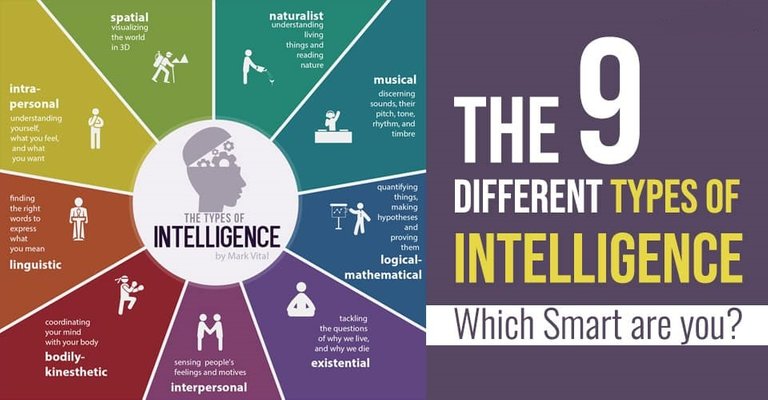The Theory of Multiple Intelligences, devised in 1983 by Howard Gardner, a psychologist and researcher at Harvard University, establishes that there is not a single dominant type of intelligence, but that there are 9 types of intelligence.
What does Garner's Theory of Multiple Intelligences want to tell us?
Basically, that academic intelligence (getting good grades) is not necessarily a deciding factor in determining whether a person is intelligent or not.
Maybe you are not good or good at mathematics (like me hee) but you can develop an amazing linguistic-verbal intelligence.
Or, you can get excellent academic grades but have problems interacting with others or knowing yourself - and these last two questions are also types and intelligence as we will see later.
Does this mean that Stephen Hawking can be just as smart as Leo Messi?
Well, according to Gardner and his collaborators, yes, it is. Because each of them has developed a different type of intelligence.
Not to mention more! Let's see what are the 9 types of intelligence according to Howard Gardener.

1. Linguistic-Verbal Intelligence
Linguistic-verbal intelligence consists of the ability to master oral and written language.
In other words, it involves the ability to understand the order and meaning of words in reading, writing, speaking, and listening.
An example of this type of intelligence is people who are good at writing, reading, telling stories, learning languages, and memorizing words and dates. Therefore, some professions that have more developed this area are journalists, speakers and writers.
2. Logical-mathematical intelligence
The logical-mathematical intelligence contemplates the capacity for logic, abstraction, complex reasoning, numerical calculations, problem solving and critical thinking.
An example of the professions that develop this type of intelligence are engineers, scientists and mathematicians.
It should be noted that, for decades, this type of intelligence was considered the mainstay of intelligence as a whole.
3. Visual-spatial intelligence
Visual-spatial intelligence refers to the ability to mentally visualize, recreate and manipulate spaces.
Other skills that this type of intelligence encompasses are: dimensioning objects, creating mental images, presenting ideas visually, perceiving visual details and drawing.
Some examples of the professions that have developed this type of intelligence are architects, photographers, and designers.
4. Musical Intelligence
Musical intelligence responds to the ability to interact with an instrument and learn its sounds, nature and capabilities in order to produce a high-level and complex piece of music.
An example of the professions that have this type of intelligence are musicians, composers and singers; as they develop an incredible sensitivity to different rhythms, timbres and tones.
5. Bodily-Kinesthetic Intelligence
Body-kinesthetic intelligence is the ability to coordinate body movements and handle objects with great skill.
It contemplates the body's ability to express emotions (as in dance), compete (as in sports) or create (as in visual arts).
An example of people who develop the cognitive dimension of body use are dancers, athletes, artisans, surgeons, and actors.
6. Interpersonal Intelligence
Interpersonal intelligence is the ability to feel empathy and to communicate and interact with other people.
An example of this type of intelligence are people who are sensitive enough to pick up on the moods, feelings and motivations of others and act accordingly.
Some professions related to this type of intelligence are psychologists, teachers, salespeople, lawyers and managers.
It is worth mentioning that interpersonal intelligence also has to do with the ability to cooperate as part of a group in order to achieve a common goal.
7. Intrapersonal Intelligence
Intrapersonal intelligence responds to the ability to know yourself and understand your own feelings, thoughts and emotions. And consequently, use this knowledge to operate effectively in life.
An example of this type of intelligence are people who have acquired the habit of introspection through constant reflection or meditation, such as philosophers, theologians or psychologists.
This type of intelligence allows people to be able to know themselves and identify key aspects such as their weaknesses and strengths, what makes them unique and different from the rest , how they react to certain events, etc.
8. Naturist Intelligence
Naturopathic intelligence translates into the sensitivity that some people show towards the natural world. It involves observing nature, recognizing flora and fauna, making certain distinctions in the natural environment, and using this skill productively.
An example could be people who are involved in agriculture and livestock, botanists or biologists.
9. Existential Intelligence
Existential intelligence refers to the ability of some human beings to use reason and thought to reflect and try to answer certain existential questions such as: who are we? Why are we in the world? What is there after death ?, etc.
Originally, in the model published in 1983 in the book The Theory of Multiple Intelligences, Gardner did not contemplate this type of intelligence, but then in 2009 he suggested that existential intelligence could be included. However, it was not possible to verify - as in the case of the previous ones - that there are certain parts of the brain that have to do with the philosophical questions of existence.
Philosophers are an example of a profession where existential intelligence is required. Great characters throughout history such as Socrates or Saint Augustine have shown to have a very high existential intelligence.
Additional intelligences

Although there are nine types of intelligence mentioned by Gardner, the author himself acknowledges that there are probably others that have not yet been discovered.
One of the most famous that has been added by other contemporary researchers is emotional intelligence, a term used for the first time by the American psychologists Peter Salovey and John Mayer (1990), although the person who made this type of intelligence really famous was Daniel Goleman in his book "Emotional Intelligence", which by the way, is a best seller (I loved it!).
However, there are those who say that emotional intelligence is equivalent to a harmonious mix between interpersonal and intrapersonal intelligence that Gardner originally proposed.
Other types of intelligence that have been suggested by other contemporary psychologists and authors are fluid intelligence, crystallized intelligence, creative intelligence (ability to innovate and create new things), collaborative intelligence (which in fact goes very hand in hand with interpersonal), among other.
In conclusion, Howard Gardner's Theory of Multiple Intelligences literally marked a watershed in the study of human intelligence, because before being discovered, we were all measured by the same bar and under the assumption that there was only one type of related intelligence. strictly with the intelligence quotient (IQ).
Now that several of us have regained hope (hahaha) our greatest wish is that the current educational and professional model know how to adapt to this reality and have the right processes to detect, develop and optimize these unique capacities that vary from person to person .
And you, what kind of intelligence do you think you have more developed? Tell me below in the comments of this post.
Article Referenced:
- https://www.psychological-consulting.com
- Howard Gardner's Multiple Intelligences Official Site https://howardgardner.com/multiple-intelligences/
- Howard Gardner's book Structures of the mind. The theory of multiple intelligences
Congratulations @psicologiaexpres! You have completed the following achievement on the Hive blockchain and have been rewarded with new badge(s) :
You can view your badges on your board and compare yourself to others in the Ranking
If you no longer want to receive notifications, reply to this comment with the word
STOPDo not miss the last post from @hivebuzz: